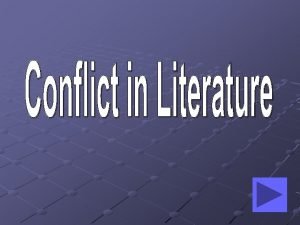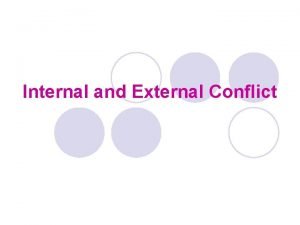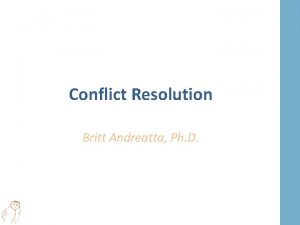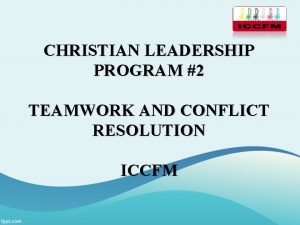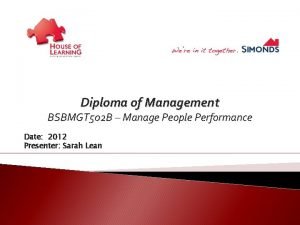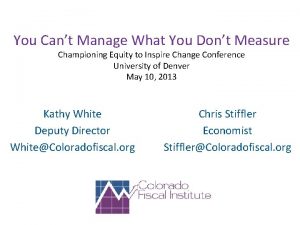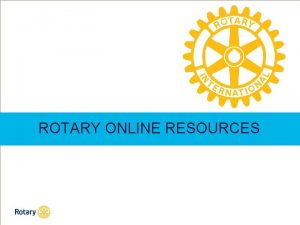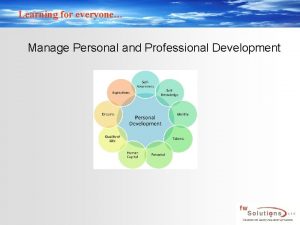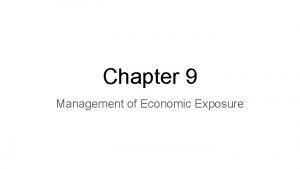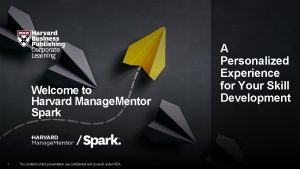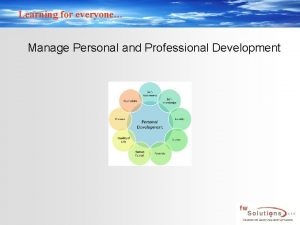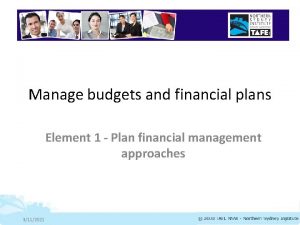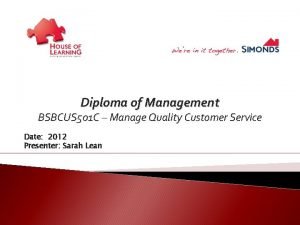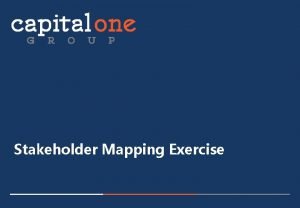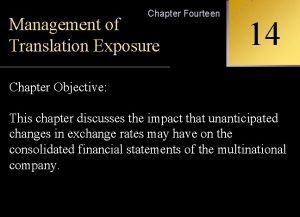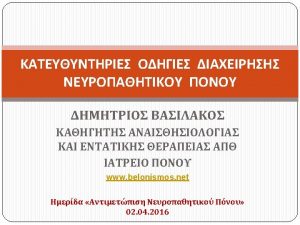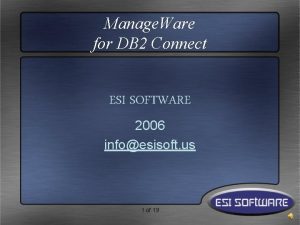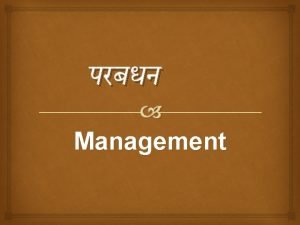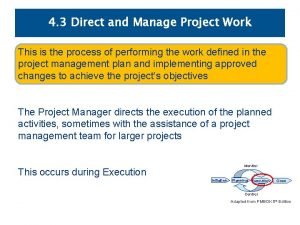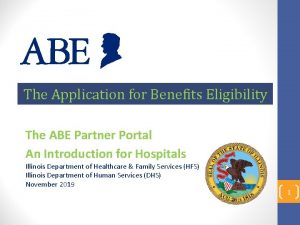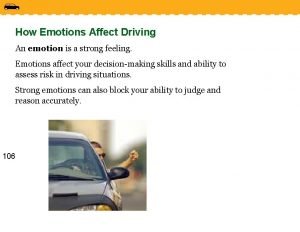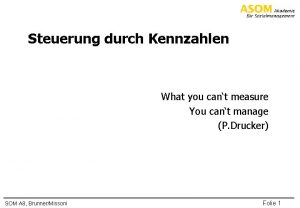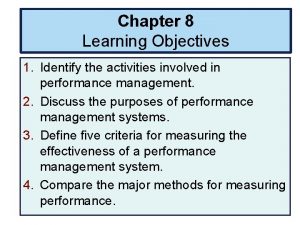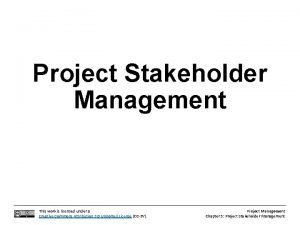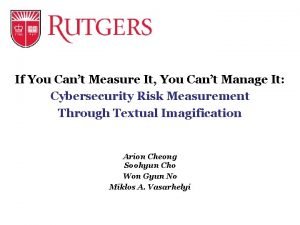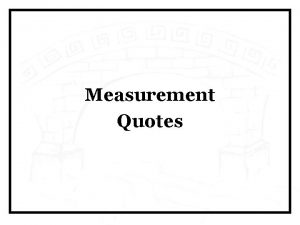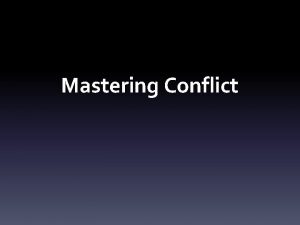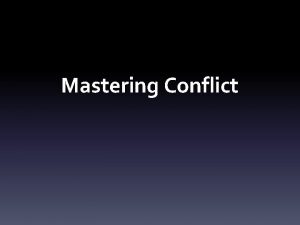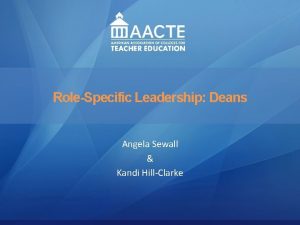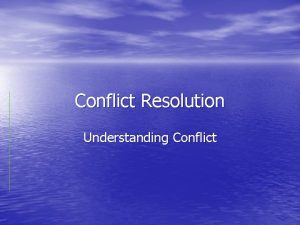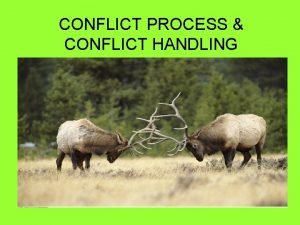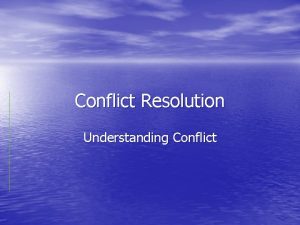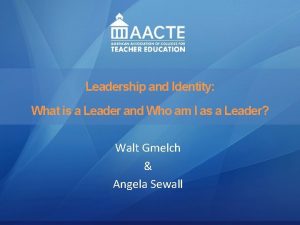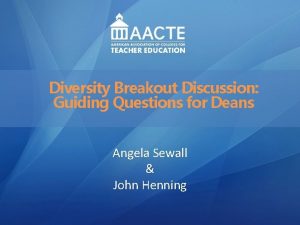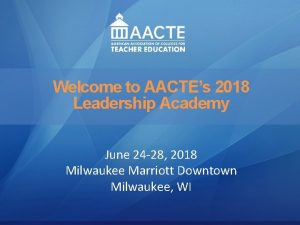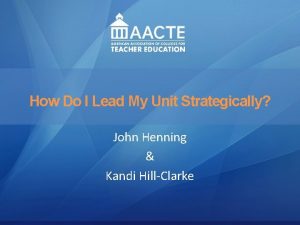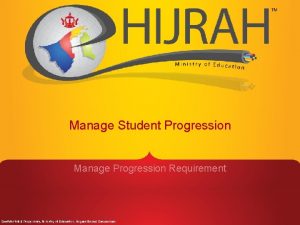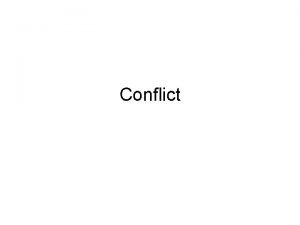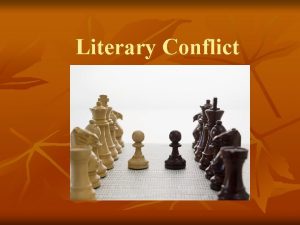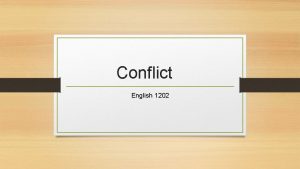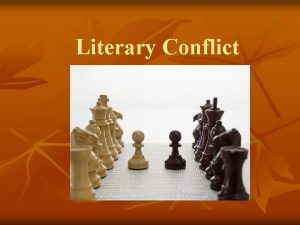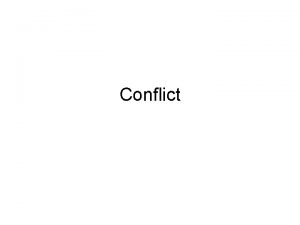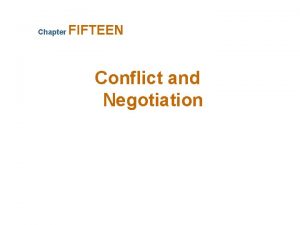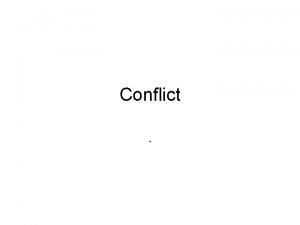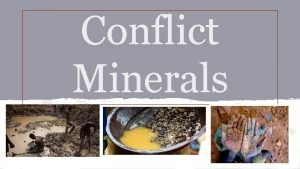Leadership How Do I Manage Conflict AACTE Leadership


































- Slides: 34

Leadership How Do I Manage Conflict? AACTE Leadership Academy Guiding Questions Angela Sewall Renee A. Middleton, Ohio University And Angela M. Sewall, UALR Patty Alvarez Mc. Hatton

Agenda • Objectives • Guiding Question American Association of Colleges for Teacher Education

Objectives • • Reflect on our beliefs about and approaches to conflict Recognize the nature and causes of conflict Respond to conflict appropriately Resolve conflict with principles - Or - American Association of Colleges for Teacher Education

Guiding Questions 01 02 03 What do we need to consider when engaging in difficult conversations? What are some strategies to diffuse situations? What are the steps that we should consider when engaging in a difficult conversation? American Association of Colleges for Teacher Education

Conflict Think – Pair – Share – What is the first word that comes to mind when you think of conflict? • List 1 or 2 synonyms for conflict – What is your biggest fear about dealing with difficulty people? – Do you have a difficult person in mind that you have dealt with? – What challenged you in your interactions with this individual? – What do you want to know about handling conflict? – Write 3 -5 sentence about a recent difficult conversation you had American Association of Colleges for Teacher Education

The Importance of Climate • Faculty concerns: Lack of respect and consideration Insufficient sense of community or belonging Lack of recognition, visibility, and/or value Ineffective communication Lack of support or inequitable distribution of opportunities and resources – Difficulties with work-life balance – Inappropriate behaviors, gender bias, micro-aggressions, hostile or condescending language and behaviors – Challenges with retention and/or tenure of women and faculty, staff, and students of color – – – (WISELI, 2010) American Association of Colleges for Teacher Education

Dealing with Conflict Know Yourself – What is your personality structure? – How do you react in stressful situations when your decisions are challenged? – Is your style fear, fight, or flight? American Association of Colleges for Teacher Education

Know Yourself and Know Your Colleagues Consider the base and phase of each – Process Communication Model • Reactor – Harmonizer, compassionate, sensitive and warm • Persister – Dedicated, observant, conscientious • Rebel – Spontaneous, creative, playful • Workaholic – Thinker – Organized, responsible and logical • Dreamer – Imaginer – Calm, imaginative and reflective), • Promoter – Adaptable, persuasive and charming (Based on the Process Communication Model - work of Taibi Kahler; Communicating Effectively: Tools for Educational Leaders 2 nd Edition by Michael B. Gilbert) American Association of Colleges for Teacher Education

Fundamental Attribution Error • When looking at another person’s behavior we jump to conclusions (i. e. , make assumptions) • They are doing what they are doing because they enjoy it • They are (fill in the blank) • And there is nothing I can do about it American Association of Colleges for Teacher Education

When Dealing with Resistance American Association of Colleges for Teacher Education

When Dealing with Resistance American Association of Colleges for Teacher Education

How Do We Typically Handle Crucial Conversations? • Biology • We’re under pressure • We don’t know where to start • We’re our own worst enemy (we act in self-defeating ways) (Patterson, et al. , 2002) American Association of Colleges for Teacher Education

Or… • We assume we know all we need to know to understand explain a situation. • We hide our feelings — or let them loose in ways we later regret. • We ignore who we are, acting as if our identity is separate from the issues. (Center for Creative Leadership, 2018) American Association of Colleges for Teacher Education

What To Do? • • Diagnose why problems occur Hold the right level of conversation Deal with motivation problems Respond to ability barriers (Patterson et al. , 2002) American Association of Colleges for Teacher Education

Begin with You: Things to Consider Sort out what happened: • How do you see the situation? • Where does your story come from (information, past experiences, rules)? • What do you think you know about the other person’s viewpoint? • What impact has this situation had on you? • What might their intentions have been? • What have you each contributed to the problem? (Center for Creative Leadership, 2018) American Association of Colleges for Teacher Education

Understand feelings: • Explore your feelings and ask yourself, “What bundle of emotions am I experiencing? ” Things to Consider Continued… Ground your identity: • How does this situation threaten you or have the potential to shake up your sense of identity? • How do you see yourself (I’m the boss, I like competition, I’m loyal, I’m good at developing my people)? • What do you need to accept in order to be better grounded? (Center for Creative Leadership, 2018) American Association of Colleges for Teacher Education

Process 1) Start with the heart (i. e. empathy and positive intent) 2) Stay in dialogue 3) Make it safe 4) Don’t get hooked by emotion (or hook them) 5) Agree a mutual purpose 6) Separate facts from story 7) Agree a clear action plan (Patterson et al. , 2002) American Association of Colleges for Teacher Education

Start with the Heart Process • Master our own stories • How is as important (if not more in some cases) that what • Self-reflect (e. g. , how may we be reinforcing the very behavior we are seeking to address? ) • Control body language • Remain open Stay in Dialogue • Can’t solve things if we don’t stay in the conversation (Patterson et al. , 2002) American Association of Colleges for Teacher Education

Make it Safe • Be attentive to response techniques (masking, avoiding, withdrawing, asserting) Three Things to Look For Process • When the moment of conversation turns crucial • Signs other person does not feel safe • Awareness of own style under duress Be a Good Listener • • Ask (to get things started) Mirror (to confirm feelings) Paraphrase (without emotion) Prime (when things stall) (Patterson et al. , 2002) American Association of Colleges for Teacher Education

Attending to Language • • • Newsbytes 2018 • From the Language of Complaint to the Language of Commitment From the Language of Blame to the Language of Personal Responsibility From the Language of New Year’s Resolutions to the Language of Competing Commitments: Diagnosing Immunity to Change From the Language of Big Assumptions that Hold us to the Language of Assumptions we Hold: Disturbing the Immunity to Change (Kegan & Lahey, 2001) American Association of Colleges for Teacher Education

Awareness Test American Association of Colleges for Teacher Education

Don’t get Hooked by Emotion • Keep focused on end goal • Refuse to play the game • Avoid the sucker’s choice (shut up or let it go) Five Tools to Assist you With This Process • Share the facts • Tell your story (i. e. , the meaning you are making of these facts) • Ask for the other person’ story • Talk tentatively • Encourage testing (goal is to reach shared meaning as a basis for moving forward) (Patterson et al. , 2002) American Association of Colleges for Teacher Education

Agree on a Mutual Purpose • Invent a mutual purpose if you can’t easily find one Process Brainstorm New Strategies • Enables you to move to finding mutual solutions • Recognize the purpose behind the strategy • Examine own motives (what do I want for me? For them? For us? Why? ) (Patterson et al. , 2002) American Association of Colleges for Teacher Education

Process Separate Facts from Story • What IS Then Move to the Story (Mutually Created) • Remember there are multiple meanings that can be drawn from the same facts Be Cognizant of the Type of Story Told • Victim stories – not my fault • Villain stories – your fault • Helpless stories – nothing I can do (Patterson et al. , 2002) American Association of Colleges for Teacher Education

Process • Agree to a clear action plan – Who is going to what by when? – What is the expected behavior going forward? American Association of Colleges for Teacher Education

The Importance of Trust • Redemption • Components of Trust – Empathy – Rigorous Logic – Authenticity • Experiencing the Wobble (Frei, 2018) Ninjatune. net

Empathy Wobbles • • You aren’t in it for them You are too self-distracted

Rigorous Logic • Quality of logic • Ability to communicate logic American Association of Colleges for Teacher Education

Authenticity Easy to be you when you are surrounded by people like you American Association of Colleges for Teacher Education

The Perfect Apology • • • Acknowledge mistake Accept responsibility Express regret Provide assurance, won’t be repeated Time it well (Kellerman, 2006) American Association of Colleges for Teacher Education

Principled Conflict Management • • • Don’t bargain over position Separate the people from the problem Focus on interests Invent options Use objective criteria (Fisher & Ury, 1985) American Association of Colleges for Teacher Education

Connections • • Leadership style Who you lead Cultural aspect of conflict Work and life balance American Association of Colleges for Teacher Education

Case Study • At your tables, discuss the difficult conversation you recollected at the start of the session – What would you do differently now based on what you have learned during this and other sessions? American Association of Colleges for Teacher Education

Remember • Dealing with conflict: – Is never fun – Is always a challenge (but manageable) – Cannot be avoided if we want to move forward together and with a winwin perspective to benefit faculty, staff, students, partners, the College, Department, School, District or Institution. – Keep in mind that “Difficult doesn’t mean impossible, it simply means that you have to work hard. ” – As we engage with and WORK with others, we have the wonderful opportunity to hone our skills, to expand our thinking and communication styles, to more fully engage the power and talent of others, and to build trust and move forward together. American Association of Colleges for Teacher Education
 Aacte leadership academy
Aacte leadership academy Internal conflict definition
Internal conflict definition Internal conflict meaning
Internal conflict meaning What is conflict and conflict resolution?
What is conflict and conflict resolution? Transformational leadership and conflict management
Transformational leadership and conflict management Christian leadership and conflict management
Christian leadership and conflict management E-rs manage your referral (myr)
E-rs manage your referral (myr) Rpkbun
Rpkbun Bsbmgt502
Bsbmgt502 You cant manage what you dont measure
You cant manage what you dont measure My rotary learning centre
My rotary learning centre Manage personal and professional development
Manage personal and professional development Manajemen berasal dari
Manajemen berasal dari Economic exposure
Economic exposure Harvard mentor manage
Harvard mentor manage Professional development trends and their validity
Professional development trends and their validity User manager for domains
User manager for domains Draft beer inventory system
Draft beer inventory system Manage budgets and financial plans
Manage budgets and financial plans Bsbcus501
Bsbcus501 Keep satisfied manage closely monitor keep informed
Keep satisfied manage closely monitor keep informed Lab 5: manage active directory accounts (module 4)
Lab 5: manage active directory accounts (module 4) Management of translation exposure
Management of translation exposure Pain res manage
Pain res manage Esi.manage
Esi.manage Man management meaning
Man management meaning Direct and manage project work
Direct and manage project work Abe manage my case
Abe manage my case One effect of high speed driving is speed smear in which
One effect of high speed driving is speed smear in which What you can't measure you can't manage
What you can't measure you can't manage Manage influencer database
Manage influencer database Chapter 8 learning to manage
Chapter 8 learning to manage Threat matrix example
Threat matrix example If you can't measure it, you can't manage it
If you can't measure it, you can't manage it If you can't measure it you can't improve it
If you can't measure it you can't improve it

